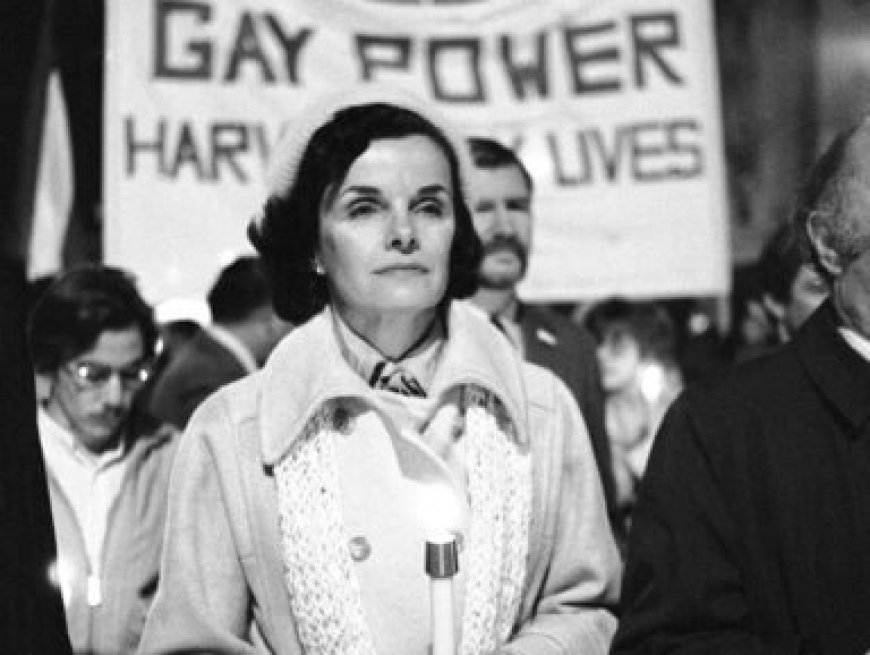Dianne Feinstein, LGBTQ ally and longtime senator, dies at 90
California Senator Dianne Feinstein, a Democrat hailed as a “fearless champion for equality,” died on Sept. 28 at the age of 90. Feinstein was the oldest senator and the first woman elected to the US Senate from California, having held her seat since 1992. Prior to joining the Senate, Feinstein served for a decade as … Read More

California Senator Dianne Feinstein, a Democrat hailed as a “fearless champion for equality,” died on Sept. 28 at the age of 90.
Feinstein was the oldest senator and the first woman elected to the US Senate from California, having held her seat since 1992. Prior to joining the Senate, Feinstein served for a decade as mayor of San Francisco and had a long history of championing LGBTQ and women’s causes.
Feinstein was one of just a handful of senators to vote against the policy to prohibit gay and lesbian people from serving openly in the US military, known as Don’t Ask Don’t Tell, and voted to repeal it in 2011, calling it a “bad law that has been with us for far too long.”
She was one of only 14 senators who voted against the Defense for Marriage Act in 1996, which stopped the federal government from recognizing same-sex marriages. More recently in 2022, she backed the Respect for Marriage Act, which ensures that same-sex marriages will continue to be recognized in all 50 states and territories, even if the Supreme Court were to overturn its 2015 ruling. She also backed the Employment Non-Discrimination Act and served as an original co-sponsor of Equality Act, though neither of those bills have become law.
In 1978 Feinstein was also the first person to announce the death of Harvey Milk, an out gay San Francisco supervisor and LGBTQ activist, and San Francisco Mayor George Moscone. She told the San Francisco Chronicle in 2008 that “it was one of the hardest moments, if not the hardest moment, of my life.”
Feinstein also said the killings contributed to her strong position in favor of gun control — she introduced legislation that essentially banned assault weapons starting in 1994, until the law expired in 2004. She unsuccessfully attempted to introduce another assault weapons ban in 2013.
Feinstein’s record on LGBTQ rights, though, also included some blemishes. In 1982, as mayor of San Francisco, she vetoed a bill that would have extended health insurance benefits to same-sex couples.
Over the past several years Feinstein received criticism for not stepping down from her seat in the senate. Despite reports that she was not in good health, Feinstein announced she would serve out her current six-year term through 2025.
Congregation Beit Simchat Torah (CBST), an LGBTQ-inclusive synagogue in New York City, mourned Feinstein’s death in an Instagram post.
“Today we mark the passing of Sen. Dianne Feinstein, the first Jewish woman ever elected to the U.S. Senate, and along with Sen. Barbara Boxer (who is also Jewish), became the first female pair of US senators to represent any state at the same time,” CBST wrote. “May her memory be for a blessing.”
Feinstein’s passing was met with mourning from Kelley Robinson, Human Rights Campaign president.
“Senator Feinstein’s passing is a loss for us all,” she said in a press release. “She was a fearless champion for equality, tireless fighter for justice, and paved the way for a new generation of women in leadership.”
Tony Hoang, executive director of Equality California, also released a statement honoring Feinstein.
“Senator Feinstein stood with our community back when few others did, fighting for funding and action to combat the AIDS crisis when most elected officials chose to look away,” he said. “She played a crucial role in uniting San Francisco after the horrific assassinations of Supervisor Harvey Milk and Mayor George Moscone, demonstrating exceptional leadership and compassion at a time when our LGBTQ+ community needed it most.”
Kierra Johnson, the executive director of the National LGBTQ Task Force, recalled Feinstein as “a champion for those who call California home and those seeking justice everywhere.”
“She was a trailblazer who paved the way for so many,” Johnson said. “Her deep roots in the queer community, forged as a city councilmember in San Francisco and shaped by her relationship with Harvey Milk, contributed to her unwavering supporting for LGBTQ people.”

 Mark
Mark 





